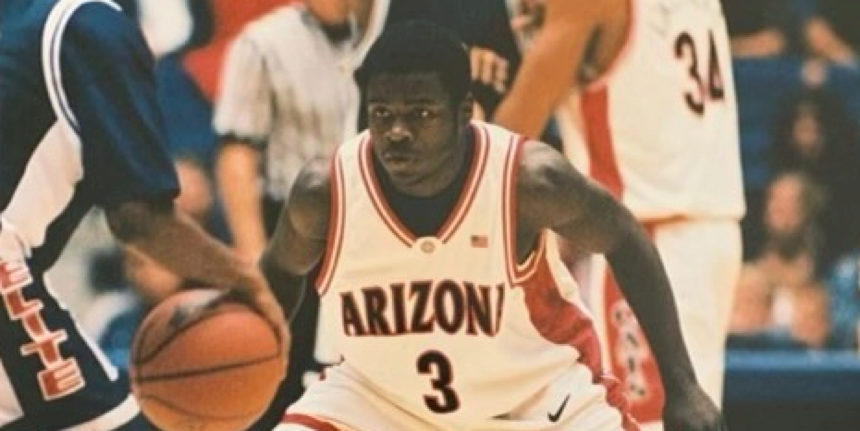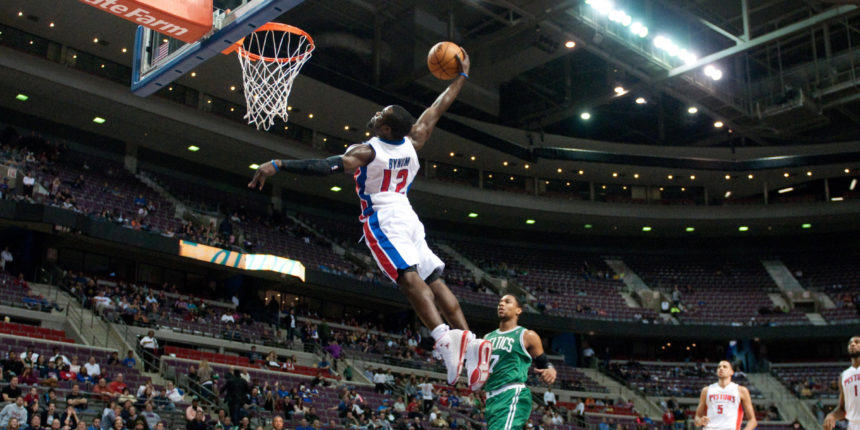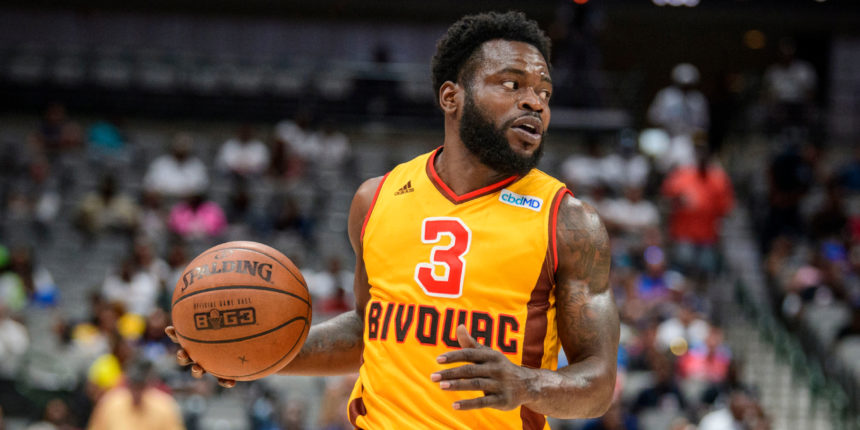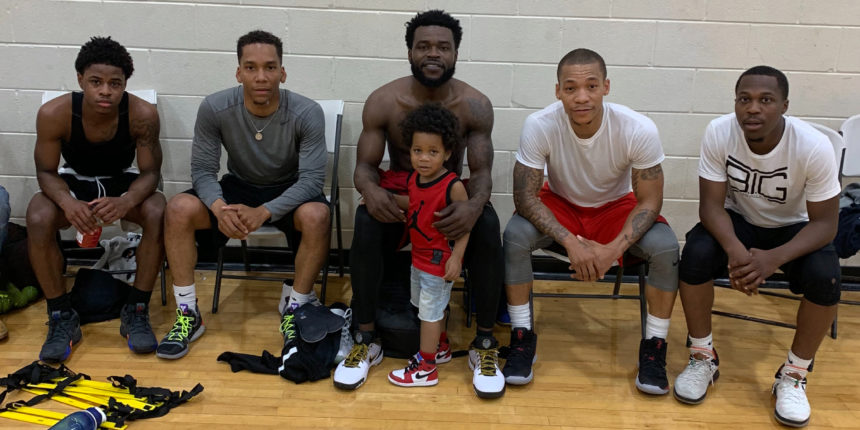Being from Chicago, it was "kill or be killed" on the court for
Will Bynum since the very beginning.
He gravitated toward basketball early in life, often joining
rugged pickup games with grown men when he was only 6 years old.
The outdoor courts were in between the surrounding buildings of the
Chicago Housing Authority, where Bynum resided during his
childhood.
“I would be out there playing with them, falling on the floor,
getting scratches and bruises,” Bynum told BasketballNews.com in an
exclusive phone interview.
As he got older and into his pre-teens, Bynum learned how to
finish, adding a floater and sharpening his mid-range game, all the
while getting faster and using his athleticism to one-up those who
were bigger than him.
“With size, I never really had a problem,” Bynum said. “It was
all of these other things that were actually advantages for me
rather than it being a disadvantage for my height.”
The first time Bynum dunked on somebody was the summer after his
freshman year at Crane High School. It wasn’t out of the ordinary
to him, though, since he’d been dunking on shorter rims from a
young age while playing organized ball in a league called Small
Fry.
“The rims were eight-and-a-half feet, and I would be able to
dunk back then,” Bynum said. “When I was like 8 or 9, I was dunking
on the rim. We would make courts in the backyard and be dunking so
I was already like that, and then I actually started to train my
legs to enhance my vertical. I didn’t start that until I was like
14.
“Once I knew my body was getting stronger, I just started doing
toe raises, like a thousand of them a day. And my legs would be
hurting, so I picked up some Jumpsoles, and then after a while, I
went from maybe a 30-inch vertical to a 45-inch vertical in like
six months. But I was obsessively training with the toe raises and
Jumpsoles.”
There wasn’t any situation that kept him from competing with
fire. That same summer, Bynum joined a pro-am league with his high
school coach Anthony Longstreet. The Chicago Pro-Am featured
notable NBA talents such as Antoine Walker and Jamal Crawford, who
would work out with Tim Grover prior to playing in the games
themselves. It didn’t take long for Bynum to make his mark in this
league.
“When I started playing in it, I was killing it,” Bynum said. “I
was having like 50-[point performances] and 60s, way better than
high school. So that’s how my name kind of blew up, so at that time
frame, I knew that I could play with pros. I knew that I was better
with pros than I was with my own age level, because my entire life
I was playing with older people.
“So when that happened in high school, every year I would
dominate, getting 60s and 70s, and it would be a packed house. It
was like what everybody in the city was [doing on] the weekends in
Chicago, but they were coming to see a high school kid, and it was
me. So at that time frame, when I was going through that, I wasn’t
even [ranked in the] top-100 in the country at that time. But I
knew that I was because I was playing against pros. So going into
my senior year when I finally got a chance to play AAU, I shot up
in the rankings to like top-30 in the country in a few months. It
was because I already knew how good I was, but I had the chip on my
shoulder to continue to keep working because I wasn’t getting the
credit that I felt that I deserved, so I just constantly kept at it
instead of worrying about the things that I can’t
control.”
All it took was one local television station, WGN-TV, to air his
highlights, and "The Thrill" was born.

Following a successful career at Crane, Bynum announced his
commitment to the University of Arizona to play under the legendary
Lute Olson. In his one-and-a-half year stint with the Wildcats, he
had to learn the terminology of college basketball. He “woke up” to
the details of the game thanks to Olson’s teachings, falling in
love with the process of studying film and finding the little
things he could use to his advantage.
Bynum’s time with Arizona came to an end in January 2003, as he
elected to transfer to Georgia Tech in order to be closer to home.
Looking back, Bynum recalls the waiting period in between those
stints as a memory that’s stuck with him forever.
“The year I sat out, we were No. 1 in the country when I
transferred from Arizona. I started the last game before I left. It
was a difficult time for me, sitting out and being at Georgia
Tech,” Bynum said. “And we were losing during that time frame at
Georgia Tech, and leaving a situation like that where [Arizona was]
No. 1 in the country and seeing them play against Kansas in Elite
Eight that year to go to the Final Four, it was heartbreaking. It
was heartbreaking because I felt like that was our year, for
Arizona to win the championship that year.”
When he got to Georgia Tech, the environment was completely
different. The loose nature that he had previously experienced in
Tucson changed into a heavily-disciplined, strictly-scheduled
regimen that Yellow Jackets head coach Paul Hewitt put together.
Bynum remembers the 4:30 a.m. to 9 p.m. grind. This is when he
realized what it would take to make it at the next level and how
dedicated he'd have to be in order to outwork everybody.
The Yellow Jackets made it to the NCAA Tournament twice,
including a national-championship appearance in Bynum’s first
season there (courtesy of his game-winning layup in the Final Four
against Oklahoma State).
“That’s pretty much what everybody remembers, so I mean that was
good, but it would have been a much better memory if we had won the
championship, you know what I mean? Just getting to go to the
championship, it kind of hurt a little bit,” Bynum said. “It was a
great moment, but I kind of like to stay away from that because we
didn’t finish the job.”
When his time was up at Georgia Tech, Bynum declared for the
2005 NBA Draft. He did not hear his name called that night.
“Yeah I was hurt, but I already knew. I had been there before,
so I knew the vision,” Bynum said. “I knew that everybody was going
to be against me. I knew that I would have to do the impossible. I
knew that I would have to do things that weren’t normal to
everybody. I’m putting 16, 18 hours [a day] into basketball over a
five-year period, obviously it has to pay off. I don’t put my
disappointments in humans’ hands. Those decisions, me not getting
drafted, those came from human beings, but people make mistakes. So
it happens. Things happen all the time, so I shouldn’t take that
and be so crushed that I don’t allow myself to grow.”
Bynum’s path was unconventional. He suited up for the Boston
Celtics in Summer League and then had a stint in the NBDL (now the
G League), where he won Rookie of the Year. This earned him a
rest-of-season contract with the Roanoke Dazzle’s parent club, the
Golden State Warriors, in 2006. However, after 15 games with the
Warriors, he was ultimately waived. At this point, he ventured over
to Israel to play for Maccabi Tel Aviv.
“It was different because I just didn’t know; it was the
uncertainty of not knowing,” Bynum said. “I’m thinking I’m going to
go somewhere with sand and camels. Like, I had no idea that it was
going to be a beautiful, amazing city to grow and learn from. It
wasn’t tough, it was a great place! Israel is one of the best
places I’ve ever been to in my life. It’s a beautiful place, the
people were accepting and warming of me. It was a family type of
atmosphere from day one to the last day I was there.”
It wasn’t the setting that gave him issues. It was the rules.
Bynum couldn’t use his pivot foot or operate from the triple-threat
position without being whistled for a travel. While reminiscing
about getting called for four turnovers per game and getting
grilled by the coaching staff, Bynum can't help but laugh. Once he
figured that out, it was smooth sailing. He ended up helping Tel
Aviv win the Israeli League Championship and secured IBL Finals MVP
in 2007.
The next season with Maccabi was similarly successful, even
though the team didn't repeat and Bynum had to deal with an
off-court incident at a nightclub that was out of his control and
saw him imprisoned for four days. (Bynum was cleared of any
wrongdoing months later). However, thanks to his teammate and
highly-touted NBA prospect Omri Casspi, Bynum would catch the right
eyes at the right time.
The Detroit Pistons were fascinated by Casspi, which led to them
stumbling upon Bynum. Team president Joe Dumars was watching a film
session and Bynum stood out.
“Joe was like, 'Yo, who was that on there? I know Omri Casspi's
supposed to be good, but who was that?' And that's how I got to
Detroit,” Bynum said. “Just the way that everything came about with
that situation was God.”
In 2008, Bynum was back in the Summer League, playing for
Motown’s winning franchise. He signed a contract that July, making
it to the Association for good, as he’d always set out to
do.
For a respected, championship organization to go out of the way
to get him, you might figure that was the moment his basketball
career was validated. But with his self-belief, Bynum never felt
that he needed validation. That is, until a chilly December day in
Washington D.C. when one of his idols made him appreciate his true
talents.
“We had the practice at the Verizon Center. It was one of them
days where we came in the day before [a game] and we had a
practice,” Bynum recalled. “I ended up having a great practice. I
was defending [Allen Iverson], picking him up full court and I made
it tough on him, and we beat their team. We would be going at it in
practice, and he just came to me like, 'Yo Bynum, bro, you are
really, really good. Like, really, really good.'
“For me, that was everything because I grew up looking up to
Iverson, I grew up watching his entire career; I knew everything
about him. So for him to tell me that, it was like all the fuel I
needed at that point. It was like, to get there and now you're
there and you're looking at everybody like competition, and
somebody that you idolize tells you that you are what you had faith
in [becoming] this entire time? I just... it was one of them
things... man, I don't know. It was like a dream come true type of
situation, and it just fueled everything from that day forward --
my work ethic, my confidence. Everything got up after that
day.”
Bynum wound up dropping a franchise-record 26 fourth-quarter
points a couple months later in an April win over the Charlotte
Bobcats. The next season, he recorded a 20-assist night in a
victory against the Washington Wizards. In July 2010, he signed a
three-year, $9.75 million contract and played for the Pistons until
October 2014, when he was traded to the Boston Celtics and
subsequently waived.
Several months later, he traveled to China to play for the
Guangdong Tigers and appeared in 30 games, then returned to the
United States to join the Washington Wizards at the end of the
2014-15 season. A second go-round with Guangdong followed, and a
preseason stint with the Atlanta Hawks in the fall of 2016 would be
Bynum’s final NBA stop. Next, he returned to the league where it
all began -- the G League. He joined his hometown Windy City Bulls
for a season before heading to Turkey for three games in 2018.
“I’ve been all over. It’s just been a blessing, a great blessing
and a thankful journey at the same time,” Bynum said. “Yeah, it’s
been tough, but all of the things that I went through and learned
throughout the process of all this is priceless. Because it keeps
me whole in times of uncertainty like now.”

Bynum’s ability to build relationships began in his early
days.
Growing up nearby in the projects, Tony Allen was on the streets
and out of school. Knowing he was straying toward the wrong path,
Bynum persuaded Allen to come to Crane to straighten things out and
play basketball. The two even lived together, working out daily
from the crack of dawn, playing one-on-one and breaking down film
from games. They recorded SportsCenter to watch highlights, and
when the commercials came on, they did toe raises and
push-ups.
Bynum and Allen later met as opponents in the 2004 Final Four
game mentioned earlier, with the former creating his own
SportsCenter-worthy highlight. Allen became a household name in the
NBA and a fan favorite, specifically as a staple of the Memphis
Grizzlies. The Grindfather was the heart and soul of the team,
coining the term "Grit and Grind" and making things tough for every
opponent who entered the Grindhouse. The longtime friends are
starting their own podcast soon on Kevin Garnett’s network.
Though Bynum didn’t win a national championship at either school
he played for, he did meet a man at Georgia Tech whom he considers
a brother in Jarrett Jack. Jack taught Bynum many lessons on and
off the floor, and introduced him to a different perspective he’d
never considered.
“I would say just his willingness to open up to me [was the most
important thing I learned],” Bynum said. “He does that with
everybody, and that’s a thing that I kind of picked up on when I
was younger and added to myself. From a mentality standpoint, it
eased me up. It actually helped me to understand the value of
sharing the basketball and the value of uplifting your teammates.
Because I would be in such a competitive space that I would be
competing, and these would be my teammates.
“There’s a difference between competing and lifting at the same
time. So I was able to pick that up from Jarrett immediately and
learn that as a kid and carry it throughout my entire career. It’s
a different mentality when you’re looking at the big picture and
you’re looking at the effects of everybody and how can you help
everybody instead of looking at it like a competition.”
Bynum commends Jack for the job he’s done playing with the G
League Ignite, an opportunity he says he would’ve jumped on had it
been available to him.
During his time in Detroit, Bynum reconnected with Josh Smith as
teammates for the first time. The two originally met each other
when a high-school-aged Smith played pickup in Atlanta with Bynum
and his Georgia Tech teammates, Isma'il Muhammad and B.J.
Elder.
Two years ago, Smith recruited Bynum to the BIG3 and they teamed
up on Bivouac -- a team in Ice Cube’s upward-trending
three-on-three league.
“I had to end up looking [the team name] up,” Bynum said. “It's
an army of ants! (laughs) An army of ants? Yep! But the BIG3 was a
great opportunity for me to just be free. I've never gotten the
opportunity to be free and play the way I play, play my game. So
the BIG3 allowed me the opportunity to where I could showcase who I
am. How Chicago knows me is different from the way the world knows
me, you know what I mean? It's different, it's just totally
different.
“If I have the freedom to do what I want to do on the court,
it's gonna be a problem for whoever, I don't think it matters,
especially with three players on the court. I'm one of the best
one-on-one players in the world, so with three players on the
floor, it's gonna be hard to get the next help guy over to stop
[me]. It's hard. It's a hard thing to do because the reads are so
easy and I've been playing for so long."
Bynum believes his Bivouac are going to stay together for the
next season of the BIG3, and we might see the league expand with
more teams in the near future.
Without Dumars bringing him to the Pistons and the NBA, Bynum
wouldn’t have had the opportunity to grow such important bonds such
as the one with Smith, not to mention the relationship he has with
Dumars’ son, Jordan. The longtime executive left Detroit’s
organization in 2014, later accepting a position at Independent
Sports and Entertainment as the company’s president of basketball
operations in 2017.
Little did Bynum know, he was about to reunite with Dumars and
discover a new passion.

Dumars hired Bynum as a trainer for ISE almost right away to
assist incoming prospects as they prepared for the NBA Draft.
Former Pistons legends Ben Wallace and Rasheed Wallace were brought
in to work with the bigs, while Bynum took care of the guards. Ever
since, Bynum has traveled to Los Angeles to train players every
year, and he's seen many of his prospects become NBA draftees.
Bynum enjoyed this so much that he kept the job going in Chicago
and ended up creating his own academy for skills training called
Grind Family.
“It's more so a mentality,” Bynum said. “It's what it took for
me to achieve and be the person that I am today and accomplish the
things I accomplished. Grind Family is the mentality that it takes
to make it out of here in the city or any poverty-stricken
community or whatever situation, so I took that [and founded
this].”
Bynum has an AAU program built under the brand’s umbrella,
as
well as a clothing line. He has plans to open the Grind Family
shoe store in a few years, with health-and-wellness products such
as wheatgrass and sea moss available as well. (It was actually up
and running at one point, but the pandemic forced it to prematurely
shut down). Bynum is big on nutrition, and he plans for the store
to have a nurturing environment.
“Basically, [it will] be a home place for the kids in the city
to be able to come and get all the information they need to become
better men or better women,” Bynum said. “That's gonna start in the
gym, and then off the court, whether that's if they're hanging out
at my store, whether that's if they're playing AAU with me, whether
that's if I'm just communicating with them and mentoring 'em
through the phone consistently.”
He is in constant communication with players he has worked with,
present and past. For example, Illinois standout Ayo Dosunmu
attended one of his camps when he was younger. Bynum is close with
fellow Chicago natives Talen Horton-Tucker, Kendrick Nunn and
Alfonzo McKinnie, whose NBA careers are just getting started.
One of his closest friends (and original pupils) is Patrick
Beverley. He maintains that the Clippers’ defensive stalwart's life
changed when the two had a conversation at a time when Beverley was
at a mental low point.
“We had these conversations, got closer,” Bynum said of
Beverley. “I moved out with him and he started to pick up on my
routine, my work ethic, what I'm doing. It's like sharing
information and building at the same time, and it helps out
everybody. It's not a thing where he just benefits or I just
benefit. We both benefit, and this is the way it should be."
For Bynum, the satisfaction of his training and work with these
players comes through their individual successes. He remembers the
advice he gave to Nunn prior to him getting to the NBA and sees
that wisdom come into play every time the Heat sophomore steps onto
the floor. Bynum’s also had the chance to mold current Pistons
rookie Killian Hayes and former Knicks guard Allonzo Trier among
others.
“I've had so many players that come through and I see things in
'em, and over the course of time for a year or two after working
with 'em, those things come true. That's a beautiful thing,” Bynum
said.
Picking up strengths and weaknesses of players comes instantly
to Bynum. He considers what position they play, their size and the
situation they’re in, then watches film with them and devises a
plan to maximize their talent and help them become elite. His
wealth of experience helps when it comes to figuring things out for
them on the court, but attitude is everything if they want to make
it.
“The key to it all is character and upbringing because potential
is just a thing. It doesn't reach the full maximum of talent unless
you have work ethic and character behind it, so that's the
importance of that,” Bynum said. “That's why a lot of people, they
can be extremely talented, but they don't last or they don't make
it out or they're one year and done in the league or three years
and done in the league. That's because character is
everything."
Next month, Bynum is going to move to Scottsdale, Arizona. It’s
a decision that’s two-fold in respect to staying connected to home
and continuing his training program.
“I'm gonna give guys an outlet to be able to come out and train
in the summer and be in a nice area where they don't have to worry
about too many different things,” Bynum said. “Also, Chicago kids,
same way where they don't have to grow up in that type of
upbringing, they have me out there. On top of that, it allows me to
attack the Chicago situation professionally and not have my
emotions in it.
“Because I grew up here, sometimes I have my emotions behind a
lot of things, so for me, being able to separate that in itself by
moving my family out and just getting that different perspective of
it and just focusing on the things I can do to help Chicago, that's
where I'm at mentally right now. I tried to be here and do it, and
it's just hard. It's too hard to be here and do it, and the way
Chicago is, it's so segregated. It's tough. You go to other places
and it's easier to do things. So for me, it's that. It's doing
things genuinely and with the right people and trustworthy people.
That's all."

It always comes back to being a Chicago native and being a
Chicago hooper, a part of him that will always hit close to his
heart.
“I would define a Chicago hooper as tough, like mental
toughness. Not physical toughness, but mental toughness,” Bynum
said. “The fortitude to be able to get knocked down and get back up
again, and gather yourself and be even better. I think that is what
it’s all about. I think it’s that mental toughness that allows you
to not fold when things don’t go right, or when things go
wrong.”
Every step of Bynum’s journey has taught him something new. At
this point of his life, he’s made it a mission to pay it forward to
those who are just starting theirs.

:filters:quality(95)/images/story/1949/125558437_162385568914335_828014752572721709_n-1_lg_690w.jpg)



:filters:quality(95)/images/assets/BasketballNews-Beta%403x.png)